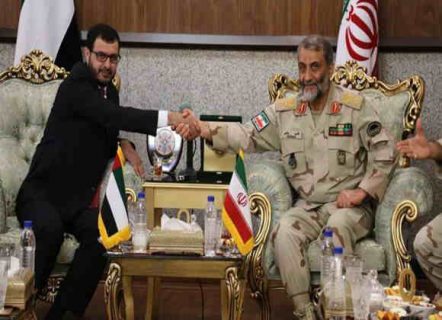Stepping Back from the Brink (2)

Is the UAE also getting cold feet about a showdown with Iran?
There’s no end of surprises from the UAE these days. First, there was the series of reports indicating Abu Dhabi would withdraw or at least redeploy or reduce the number of, its troops in Yemen. Then on Wednesday, we learned a high-level Emirati security delegation was visiting Tehran, amid other signs the UAE was trying to woo the country that, until very recently, it was demonised as the arch-enemy and cause of all the region’s troubles.
The seven-member Emirati delegation led by the head of the country’s coastguard held intensive meetings with its Iranian counterparts, and both sides stressed the need to maintain positive diplomatic relations and cooperation to ensure sustained maritime border security.
This was the first such meeting since 2013. It was requested by the Emirati side and followed a visit to Moscow by Foreign Minister Sheikh Abdallah Bin-Zayed. Reports at the time indicated he was seeking Russia’s mediation to ease tension and open channels of dialogue with Iran as part of an overall re-think of UAE regional policy, especially with regard to Yemen and Iran.
Emirati political leaders and military chiefs have come to the conclusion that the Yemen war is unwinnable and that UAE will be the main loser if any wider regional conflict breaks out. The Iranians have shown their capacity and determination to retaliate forcefully to any aggression: downing an American drone, capturing a British tanker in response to the UK’s seizure of an Iranian tanker, helping Yemen’s Houthis launch missile strikes against Saudi Arabia, and reminding everyone of their ability to disrupt shipping in the Gulf. It is clear that in the event of broader hostilities breaking out, they will consider the UAE a main instigator and participant and a legitimate target for retaliatory missile strikes and other actions.
The official line from Abu Dhabi is that the delegation’s visit to Tehran was purely ‘technical’ in nature. But things are never as simple as that in our Arab world. Saudi Arabia has also been apparently trying to ease tensions with Tehran of late. But that does not necessarily mean the two countries are acting in concert. Indeed, there are growing signs that their respective de-facto rulers, Muhammad Bin-Salman and Muhammad Bin-Zayed, have fallen out over a number of issues. For one thing, they are no longer able to conceal the stark divergence in their policy aims in Yemen, where the UAE was Saudi Arabia’s only real Arab ally. Riyadh has remained suspiciously quiet about Abu Dhabi’s announcement that it is pulling its forces out of the country.
Nevertheless, it seems increasingly clear that as the US administration continues to up the ante against Iran, its closest Gulf allies, who had been urging it to get ever tougher with Tehran, are getting cold feet. The Iranians have stated publicly that US bases and other infrastructure in these countries will be subjected to massive retaliation if war breaks out. The vulnerable UAE was the second Gulf country, after Kuwait, to pick up that message.
In the UAE’s case, the issue is broader. The adventurist and interventionist foreign policy the country has been pursuing in recent years has backfired badly. It has contributed to causing mayhem in Yemen, Libya and elsewhere, and has tarnished its international reputation. It has also, most importantly, undermined the UAE’s only real success a state: the unification of seven Gulf emirates into a single federation. There is growing disaffection in Dubai, Sharjah, Ras al-Khaimah and elsewhere with Abu Dhabi’s dominant role, aggressive regional posture and excessive alignment with the US administration – including on the issue of normalisation with Israel.
It is indeed high time for a re-think.
https://www.raialyoum.com/index.php/stepping-back-from-the-brink-2/
 TheAltWorld
TheAltWorld 
0 thoughts on “Stepping Back from the Brink (2)”